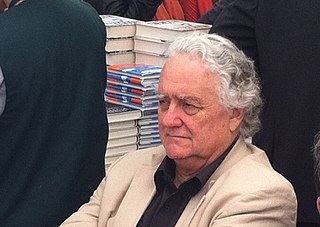
Konrad Zacharias Lorenz was an Austrian zoologist, ethologist, and ornithologist. He shared the 1973 Nobel Prize in Physiology or Medicine with Nikolaas Tinbergen and Karl von Frisch. He is often regarded as one of the founders of modern ethology, the study of animal behavior. He developed an approach that began with an earlier generation, including his teacher Oskar Heinroth.
Evolutionary epistemology refers to three distinct topics: (1) the biological evolution of cognitive mechanisms in animals and humans, (2) a theory that knowledge itself evolves by natural selection, and (3) the study of the historical discovery of new abstract entities such as abstract number or abstract value that necessarily precede the individual acquisition and usage of such abstractions. As a branch of inquiry in epistemology, evolutionary epistemology lies at the crossroads of philosophy and evolutionary biology.

Rupert Riedl was an Austrian zoologist.

Origination of Organismal Form: Beyond the Gene in Developmental and Evolutionary Biology is an anthology published in 2003 edited by Gerd B. Müller and Stuart A. Newman. The book is the outcome of the 4th Altenberg Workshop in Theoretical Biology on "Origins of Organismal Form: Beyond the Gene Paradigm", hosted in 1999 at the Konrad Lorenz Institute for Evolution and Cognition Research. It has been cited over 200 times and has a major influence on extended evolutionary synthesis research.

William C. Wimsatt is professor emeritus in the Department of Philosophy, the Committee on Conceptual and Historical Studies of Science, and the Committee on Evolutionary Biology at the University of Chicago. He is currently a Winton Professor of the Liberal Arts at the University of Minnesota and Residential Fellow of the Minnesota Center for Philosophy of Science. He specializes in the philosophy of biology, where his areas of interest include reductionism, heuristics, emergence, scientific modeling, heredity, and cultural evolution.

Biological Theory is a peer-reviewed scientific journal covering the fields of evolution and cognition, including cognitive psychology, epistemology, philosophy of science, philosophy of biology, evolutionary biology, and developmental biology. It was established in 2005 and originally published by MIT Press, sponsored by the Konrad Lorenz Institute for Evolution and Cognition Research (KLI). As of January 1, 2012, the publisher is Springer Science+Business Media. The first editor-in-chief was Werner Callebaut of the KLI and the University of Vienna). The current editor-in-chief is Stuart A. Newman of New York Medical College.

Gerd B. Müller is an Austrian biologist who is emeritus professor at the University of Vienna where he was the head of the Department of Theoretical Biology in the Center for Organismal Systems Biology. His research interests focus on vertebrate limb development, evolutionary novelties, evo-devo theory, and the Extended Evolutionary Synthesis. He is also concerned with the development of 3D based imaging tools in developmental biology.
The Vienna Series in Theoretical Biology is a book series published by MIT Press and devoted to advances in theoretical biology at large. By promoting the formulation and discussion of new theoretical concepts, the series intends to help fill the gaps in our understanding of some of the major open questions of biology, such as the origin and organization of organismal form, the relationship between development and evolution, and the biological bases of cognition and mind.
The Altenberg Workshops in Theoretical Biology are expert meetings focused on a key issue of biological theory, hosted by the Konrad Lorenz Institute for Evolution and Cognition Research (KLI) since 1996. The workshops are organized by leading experts in their field, who invite a group of international top level scientists as participants for a 3-day working meeting in the Lorenz Mansion at Altenberg near Vienna, Austria. By this procedure the KLI intends to generate new conceptual advances and research initiatives in the biosciences, which, due to their explicit interdisciplinary nature, are attractive to a wide variety of scientists from practically all fields of biology and the neighboring disciplines.

Irenäus Eibl-Eibesfeldt was an Austrian ethologist in the field of human ethology. In authoring the book which bears that title, he applied ethology to humans by studying them in a perspective more common to volumes studying animal behavior.
Human ethology is the study of human behavior. Ethology as a discipline is generally thought of as a sub-category of biology, though psychological theories have been developed based on ethological ideas. The bridging between biological sciences and social sciences creates an understanding of human ethology. The International Society for Human Ethology is dedicated to advancing the study and understanding of human ethology.
Cognitive biology is an emerging science that regards natural cognition as a biological function. It is based on the theoretical assumption that every organism—whether a single cell or multicellular—is continually engaged in systematic acts of cognition coupled with intentional behaviors, i.e., a sensory-motor coupling. That is to say, if an organism can sense stimuli in its environment and respond accordingly, it is cognitive. Any explanation of how natural cognition may manifest in an organism is constrained by the biological conditions in which its genes survive from one generation to the next. And since by Darwinian theory the species of every organism is evolving from a common root, three further elements of cognitive biology are required: (i) the study of cognition in one species of organism is useful, through contrast and comparison, to the study of another species' cognitive abilities; (ii) it is useful to proceed from organisms with simpler to those with more complex cognitive systems, and (iii) the greater the number and variety of species studied in this regard, the more we understand the nature of cognition.

Werner Callebaut was a professor at the University of Hasselt, scientific director of the Konrad Lorenz Institute for Evolution and Cognition Research, editor and chief of Biological Theory, and president of The International Society for the History, Philosophy, and Social Studies of Biology.
Michael J. Owren was a Norwegian born American psychologist who contributed to the understanding of animal communication, the evolution of language, emotional communication, and vocal acoustics. His work focused on vocal phenomena in animals and humans. He pioneered digital spectral analysis techniques, first developed in speech science, for use in studies of animal communication. He studied primate vocalizations in terms of acoustics and communicative functions.
The Konrad Lorenz Forschungsstelle (KLF) is a research facility in Grünau im Almtal, maintained jointly by private and public entities. The KFL is dedicated mainly to behavioral biology of birds and named after the Nobel laureate Konrad Lorenz, who established the facility in 1973.
The Konrad Lorenz Institute of Ethology is a research institute in Vienna, Austria, dedicated to studying behavioral biology and the links between animal behaviour and conservation. Founded by the animal photographer Otto Koenig and his wife, the illustrator Lilli Koenig as “Biologische Station Wilhelminenberg” in 1945, it was later named after the Nobel laureate Konrad Lorenz and incorporated into the University of Veterinary Medicine Vienna in 2011.

Jorge Wagensberg Lubinski, was a Spanish professor, researcher and writer.
Kevin Neville Lala is an English evolutionary biologist who is Professor of Behavioural and Evolutionary Biology at the University of St Andrews in Scotland. Educated at the University of Southampton and University College London, he was a Human Frontier Science Program fellow at the University of California, Berkeley before joining the University of St Andrews in 2002. He is one of the co-founders of niche construction theory and a prominent advocate of the extended evolutionary synthesis. He is a fellow of the Royal Society of Edinburgh and the Society of Biology. He has also received a European Research Council Advanced Grant, a Royal Society Wolfson Research Merit Award, and a John Templeton Foundation grant. He was the president of the European Human Behaviour and Evolution Association from 2007 to 2010 and a former president of the Cultural Evolution Society. Lala is currently an external faculty of the Konrad Lorenz Institute for Evolution and Cognition Research.
Lee Altenberg is an American theoretical biologist. He is on the faculty of the Departments of Information and Computer Sciences and of Mathematics at the University of Hawaiʻi at Mānoa. He is best known for his work that helped establish the evolution of evolvability and modularity in the genotype–phenotype map as areas of investigation in evolutionary biology, for moving theoretical concepts between the fields of evolutionary biology and evolutionary computation, and for his mathematical unification and generalization of modifier gene models for the evolution of biological information transmission, putting under a single mathematical framework the evolution of mutation rates, recombination rates, sexual reproduction rates, and dispersal rates.

Wolfgang M. Schleidt is an Austrian scientist specializing in the areas of bioacoustics, communication and classical ethology. He was assistant to Konrad Lorenz, professor of zoology at the University of Maryland (1965–1985) and director at the Konrad Lorenz Institute for Ethology, Vienna of the Austrian Academy of Sciences. He was an early pioneer of bioacoustics and of the quantitative analysis of behavior.










